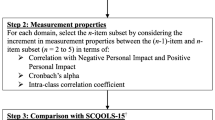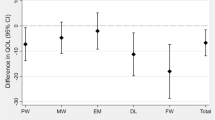Abstract
Purpose
To evaluate the measurement properties of the 15-item Singapore Caregiver Quality of Life Scale (SCQOLS-15) in family caregivers of patients with heart diseases.
Methods
The SCQOLS-15 survey was self-administered by family caregivers of patients with chronic heart diseases, at baseline and 1 week later. The criterion validity of SCQOLS-15 and its domain scores was assessed by calculating the Spearman correlation coefficient (ρ) with the Brief Assessment Scale for Caregivers (BASC), Caregiver Reaction Assessment (CRA), and their sub-scores. Known-group validity was assessed using the New York Heart Association (NYHA) functional class. Test-retest reliability was evaluated using the intraclass correlation coefficient (ICC).
Results
Of the 327 caregivers included, 65% were adult children and 28% were spouses. The distribution of NYHA classes of the patients was I: 27%, II: 40%, III: 24%, and IV: 9%. There was a positive correlation between the SCQOLS-15 and BASC total scores (ρ = 0.7). SCQOLS-15 domain scores were also correlated with BASC and CRA sub-scores as per a priori hypotheses, with absolute values of ρ ranging from 0.4 to 0.6. The mean values of SCQOLS-15 total and all domain scores were lower among caregivers of patients with NYHA class III/IV compared to those of class I/II patients (each P < 0.05). Among 146 caregivers who completed the follow-up and self-rated a stable quality-of-life, ICCs for test-retest reliability of SCQOLS-15 total and all domain scores were ≥ 0.8.
Conclusion
The SCQOLS-15 is a valid and reliable instrument for measuring the quality of life in caregivers of heart disease patients.

Similar content being viewed by others
References
Roth GA, et al. Global, regional, and national burden of cardiovascular diseases for 10 causes, 1990 to 2015. J Am Coll Cardiol. 2017;70(1):1–25.
Lahoz R, et al. Caregivers of patients with heart failure: Burden and the determinants of health-related quality of life. Patient Prefer Adherence. 2021;15:1153.
Lacerda MS, et al. Depressive symptoms in the family caregivers of patients with heart failure: an integrative review. Rev Gaucha Enferm. 2019;40:e20180057. https://doi.org/10.1590/1983-1447.2019.20180057.
Petty M, et al. Baseline quality of life of caregivers of patients with heart failure prior to advanced therapies: findings from the Sustaining Quality of Life of the Aged: Transplant or Mechanical Support (SUSTAIN-IT) study. J Cardiac Fail. 2022;28:1137.
Jackson JD, et al. Burden of heart failure on caregivers in China: results from a cross-sectional survey. Drug Des Dev Ther. 2018;12:1669.
Kitko L, et al. Family caregiving for individuals with heart failure: a scientific statement from the American Heart Association. Circulation. 2020;141(22):e864–78.
Whittingham K, Barnes S, Gardiner C. Tools to measure quality of life and carer burden in informal carers of heart failure patients: a narrative review. Palliat Med. 2013;27(7):596–607.
Lee GL, et al. Quality of life domains important and relevant to family caregivers of advanced cancer patients in an Asian population: a qualitative study. Qual Life Res. 2015;24(4):817–28.
Vickrey BG, et al. Development and preliminary evaluation of a quality of life measure targeted at dementia caregivers. Health Qual Life Outcomes. 2009;7(1):1–12.
Nauser JA, Bakas T, Welch JL. A new instrument to measure quality of life of heart failure family caregivers. J Cardiovasc Nurs. 2011;26(1):53–64.
Cheung YB, et al. Development and evaluation of a quality of life measurement scale in English and Chinese for family caregivers of patients with advanced cancers. Health Qual Life Outcomes. 2019;17(1):1–12.
Suksatan W, Tankumpuan T, Davidson PM. Heart failure caregiver burden and outcomes: a systematic review. J Prim Care Community Health. 2022;13:21501319221112584.
Kim K-A, et al. Factors affecting the quality of life of family caregivers of patients with heart failure: a cross-sectional study. Medicine. 2022;101(35): e30042.
Strömberg A, et al. Psychometric validation of the heart failure caregiver questionnaire (HF-CQ®). Patient-Patient-Cent Outcomes Res. 2017;10(5):579–92.
Singapore DoS. Census of Population 2020 Statistical Release 1: Demographic Characteristics, Education, Language and Religion. 2021: Singapore.
Glajchen M, et al. Development of a brief assessment scale for caregivers of the medically ill. J Pain Symptom Manage. 2005;29(3):245–54.
Melchior LA, et al. A short depression index for women. Educ Psychol Measur. 1993;53(4):1117–25.
Siow JYM, et al. Validity and reliability of the positive aspects of caregiving (PAC) scale and development of its shorter version (S-PAC) among family caregivers of older adults. Gerontologist. 2017;57(4):e75–84.
Malhotra R, et al. Validity and reliability of the Caregiver Reaction Assessment scale among primary informal caregivers for older persons in Singapore. Aging Ment Health. 2012;16(8):1004–15.
Miller-Davis C, Marden S, Leidy NK. The New York Heart Association Classes and functional status: what are we really measuring? Heart Lung. 2006;35(4):217–24.
Cheung YB, et al. Two valid and reliable short forms of the Singapore caregiver quality of life scale were developed: SCQOLS-10 and SCQOLS-15. J Clin Epidemiol. 2020;121:101–8.
Glajchen M, et al. Development and validation of the brief assessment scale for caregivers in Chinese. J Palliat Med. 2013;16(11):1394–402.
Yang GM, et al. Exploring the score equivalence of the English and Chinese versions of the brief assessment scale for caregivers. J Patient Exp. 2020;7(2):200–7.
Radloff LS. The CES-D scale: A self-report depression scale for research in the general population. Appl Psychol Meas. 1977;1(3):385–401.
Ying J, et al. Validity and utility of the center for epidemiological studies depression scale for detecting depression in family caregivers of persons with dementia. Dement Geriatr Cogn Disord. 2019;47(4–6):323–34.
Moon JR, et al. The center for epidemiologic studies depression scale is an adequate screening instrument for depression and anxiety disorder in adults with congential heart disease. Health Qual Life Outcomes. 2017;15:1–7.
Tarlow BJ, et al. Positive aspects of caregiving: Contributions of the REACH project to the development of new measures for Alzheimer’s caregiving. Res Aging. 2004;26(4):429–53.
Given CW, et al. The caregiver reaction assessment (CRA) for caregivers to persons with chronic physical and mental impairments. Res Nurs Health. 1992;15(4):271–83.
Luttik ML, et al. Caregiver burden in partners of Heart Failure patients; limited influence of disease severity. Eur J Heart Fail. 2007;9(6–7):695–701.
Saunders MM. Factors associated with caregiver burden in heart failure family caregivers. West J Nurs Res. 2008;30(8):943–59.
Saunders MM. Indicators of health-related quality of life in heart failure family caregivers. J Community Health Nurs. 2009;26(4):173–82.
Hu Lt, Bentler PM. Cutoff criteria for fit indexes in covariance structure analysis: Conventional criteria versus new alternatives. Struct Equ Model Multidiscipl J. 1999;6(1):1–55.
Fayers PM, Machin D. Quality of life: the assessment, analysis and interpretation of patient-reported outcomes. Wiley; 2013.
Lunney JR, et al. Describing death in America: what we need to know. National Academy of Sciences; 2003.
Timonet-Andreu E, et al. Health-related quality of life and use of hospital services by patients with heart failure and their family caregivers: a multicenter case-control study. J Nurs Scholarsh. 2020;52(2):217–28.
Argimon JM, et al. Health-related quality-of-life of care-givers as a predictor of nursing-home placement of patients with dementia. Alzheimer Dis Assoc Disord. 2005;19(1):41–4.
The Chronic Disease Management Programme (CDMP). https://www.moh.gov.sg/policies-and-legislation/chronic-disease-management-programme-(cdmp). Accessed 28 Apr 2023.
Hu Y, et al. Can the 12-item General Health Questionnaire be used to measure positive mental health? Psychol Med. 2007;37(7):1005–13.
Acknowledgements
Professional medical writing and editorial assistance was provided by Ravinuthula Sruthi Jagannathan from Duke-NUS Medical School, Singapore.
Author information
Authors and Affiliations
Corresponding author
Ethics declarations
Data Availability
The datasets generated during and/or analyzed during the current study are available from the corresponding author on reasonable request.
Funding
This work was supported by the Lien Centre for Palliative Care Research Award (LCPC-IN20-0002). The funding agreement ensured the authors’ independence in designing the study, interpreting the data, writing, and publishing the report.
Competing Interests
The authors have no relevant financial or non-financial interests to disclose.
Author Contributions
All authors contributed to the study conception and design. The data collection was performed by Ru-San Tan, Shir Lynn Lim, and Kai Lee Woo. The data analysis was performed by Mihir Gandhi. The first draft of the manuscript was written by Mihir Gandhi and all authors commented on previous versions of the manuscript. All authors read and approved the final manuscript.
Ethics Approval
This study was performed in line with the principles of the Declaration of Helsinki. Approval was granted by the SingHealth Central Institution Review Board (Ref. 2020/2087).
Consent to Participate
Informed consent was obtained from all individual participants included in the study.
Supplementary Information
Below is the link to the electronic supplementary material.
Rights and permissions
Springer Nature or its licensor (e.g. a society or other partner) holds exclusive rights to this article under a publishing agreement with the author(s) or other rightsholder(s); author self-archiving of the accepted manuscript version of this article is solely governed by the terms of such publishing agreement and applicable law.
About this article
Cite this article
Gandhi, M., Tan, RS., Lim, S.L. et al. Measurement Properties of the 15-Item Singapore Caregiver Quality of Life Scale (SCQOLS-15) in Family Caregivers of Patients with Heart Diseases. Patient 16, 485–495 (2023). https://doi.org/10.1007/s40271-023-00634-x
Accepted:
Published:
Issue Date:
DOI: https://doi.org/10.1007/s40271-023-00634-x




